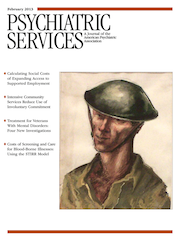Decisions to Initiate Involuntary Commitment: The Role of Intensive Community Services and Other Factors
Abstract
Objective
This study examined the predictors of actions to initiate involuntary commitment of individuals experiencing a mental health crisis.
Methods
Emergency services clinicians throughout Virginia completed a questionnaire following each face-to-face evaluation of individuals experiencing a mental health crisis. Over a one-month period in 2007, a total of 2,624 adults were evaluated. Logistic hierarchical multiple regression was used to analyze the relationship between demographic, clinical, and service-related variables and outcomes of the emergency evaluations.
Results
Several factors predicted 84% of the actions taken to initiate involuntary commitment. These included unavailability of alternatives to hospitalization, such as temporary housing or residential crisis stabilization; evaluation of the client in a hospital emergency room or police station or while in police custody; current enrollment in treatment; and clinical factors related to the commitment criteria, including risk of self-harm or harm to others, acuity and severity of the crisis, and current drug abuse or dependence.
Conclusions
A lack of intensive community-based treatment and support in lieu of hospitalization accounted for a significant portion of variance in actions to initiate involuntary commitment. Comprehensive community services and supports for individuals experiencing mental health crises may reduce the rate of involuntary hospitalization. There is a need to enrich intensive community mental health services and supports and to evaluate the impact of these enhancements on the frequency of involuntary mental health interventions.



